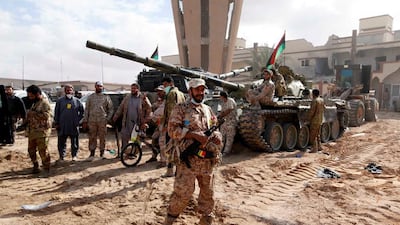According to a recent report in a British newspaper, the Trump administration is considering a plan to partition Libya to bring about peace and a new political settlement.
The Guardian reported that Sebastian Gorka, a White House policy official, has suggested the idea of dividing Libya into the three regions it had comprised before it broke from Italy’s colonial chains in 1947 and became fully independent four years later. Those three regions would be Cyrenaica in the east, Tripolitania in the west and Fezzan in the south.
The report suggested that Mr Gorka drew a projected map of Libya on a napkin while discussing the issue with a European diplomat in the days before Donald Trump was inaugurated as the American president. The diplomat is said to have described the proposed partitioning of the country as “the worst solution for Libya”.
Libya has been in chaos for almost six years, without a functioning central government and increasingly dominated by armed militias and criminal gangs. It has become a haven for terror groups. The Government of National Accord, supported by the United Nations, has brokered a peace deal, but has not been able to push it forward, let alone govern the country, since it was set up in December 2015.
Mr Trump is expected to play a more active role in bringing about a political solution in Libya, so that a national government could fight terrorism and contain illegal immigration, which are the two most important objectives of the United States and its European Union allies.
So why is carving up Libya such a bad idea?
First, tribes and clans are the cornerstone of Libyan society, making them too complicated to mess with. Intertribal relations are very strong and the social connections among clans and families are stronger still, making it almost impossible for the general population to accept the idea of dividing them up into separate countries.
Second, oil is the main source of income. The oil-producing region is exactly in the middle of the country, between east and west. Dividing up such a vital natural resource would be a complicated and difficult process during peaceful times, let alone during turbulent periods.
The third reason why division is not a good political option is that the idea of a divided Libya has been rejected in the past and has no traction now.
Most political parties in eastern Libya do not support it, while the majority of political parties in the west and south do not even like to discuss it. Indeed, there is only a small number of people calling for more independence for the three regions, but such a minority cannot win a serious political debate, let alone a national contest.
The Trump administration is expected to formulate a political approach towards Libya that preferences more Russian involvement. By contrast, the Obama administration strongly supported the GNA. This was also the position of its major European allies, including France and Germany.
Many EU countries fear that the Trump team is likely to withdraw such support from the GNA and start rapprochement with Russia to renegotiate the UN-brokered deal.
Russia has been engaged with the Syrian crisis and has, historically, given little thought to Libya. However, that appears to be changing.
Last January, field marshal Khalifa Haftar, commander of the Libyan armed forces backed by the Tobruk-based government, was received on board the Admiral Kuznetsov, the Russian flagship, while it was sailing back from its Syrian mission.
Last November, Mr Haftar visited Moscow and met Sergei Lavrov, foreign minister, to seek his help in lifting the arms embargo imposed on Libya by the UN in March 2011 when trouble first erupted against the Qaddafi regime.
Unless developments in the Syrian war upset the political status quo between Washington and Moscow, it is likely that both will find more common ground in Libya. The Russians will not accept any talk of dividing the country since it will neither bring peace or stability. Both Russia and the US worry about Libya becoming a bigger base for international terror groups. Both should understand that Libya will be easy prey for ISIL if the country is divided. Even if Mr Gorka continues to press forward his idea of redrawing the Libyan map, it is unlikely that he will find allies among the EU, let alone among the Libyan political factions, who mostly quarrel about anything except the need for their country to remain in one piece.
Mustafa Fetouri is a Libyan academic and journalist

